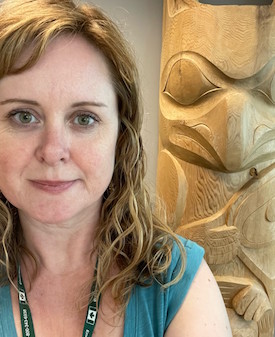“I think there is no replacement for that in-person collaboration. I really feel it was instrumental in my learning process”.
Katie Moran, MPA(M), Class of 2022
Republished from Faculty of Management, News & Events
So much to learn: Katie Moran
MPA(M) graduate appreciates blended learning and the opportunity to formalize management skills
 When Katie Moran began to research masters’ programs, she was interested in finding one that would allow her to keep working full-time, and that combined online learning with face-to-face opportunities. “I attended an information session and what really drew me to Dalhousie was the blended online delivery, because I find online training pretty dull. To me, the real learning happens when you’re able to engage with others and collaborate,” says Katie.
When Katie Moran began to research masters’ programs, she was interested in finding one that would allow her to keep working full-time, and that combined online learning with face-to-face opportunities. “I attended an information session and what really drew me to Dalhousie was the blended online delivery, because I find online training pretty dull. To me, the real learning happens when you’re able to engage with others and collaborate,” says Katie.
Levelling up
Choosing the Master of Public Administration (Management) helped her move up several levels in the federal public service: when she started the program in 2017, she was a supervisor at Immigration, Refugees and Citizenship Canada. Today she’s Funding Manager for the Terrestrial Cumulative Effects Initiative (TCEI), an interdepartmental initiative led by Environment and Climate Change Canada. The TCEI is an accommodation measure for the Trans Mountain Pipeline expansion project, which funds Indigenous-led projects that study the cumulative effects of natural resource development. Katie is a key lead on the design, implementation and delivery of project funding.
Even though she was already in middle management when she started the program (and an employee of the federal government since 2005), Katie says that the MPA helped her increase her knowledge about management within the public service. “If you want to be in management, or even on the policy side, there’s just so much that you can learn. I’m always, even with lots of thought, just hitting the tip of the iceberg,” she says, adding that the courses in the MPA even helped her to formalize her knowledge of some of the latest terminology and buzzwords in the public service. The classes also gave her a new connection to a range of public servants in different areas, a helpful expansion of her network.
While in the program, Katie was pleased to discover many opportunities to apply her learning through assignments that she could base on her work. In her Intergovernmental Relations course, she wrote an intergovernmental framework on collaborative development. “I was able to write it on my own initiative, which helped me not just learning the course material, but being able to dive deeper into what I was doing in my actual job,” she says.
Collaborative learning
In her Public Service Leadership course, a group project explored Indigenous leadership, something that relates directly to her new position. “Again, that was super helpful for the work that I do because I’m often working with Indigenous leaders,” she says. Today her work with the TCEI has her doing both of these things, working collaboratively with Indigenous communities.
Katie also engaged with the in-person intensives, travelling to Calgary and Ottawa to meet with her cohort until that element went virtual after 2019 due to the pandemic. “It gave me a great chance to meet people from different levels of government, as well as in the private sector. We had lots of really great discussions, and it’s harder to have those online. I think there is no replacement for that in-person collaboration. I really feel it was instrumental in my learning process,” she says.
For Katie, the opportunity to meet other public servants was a real bonus of the program, and her advice for fellow students is to lean into both the programs and those relationships, to get as much out of the experience as they can. “Really being able to understand and get an appreciation for the different kinds of work that public servants do at the different levels of government, like municipal and provincial, that I was really grateful for, being able to meet and really just understand more from other classmates,” she says.